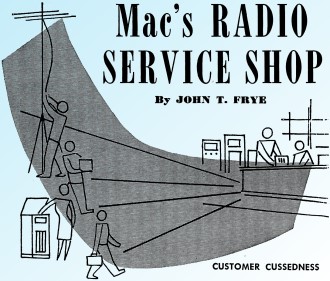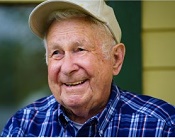Mac's Radio Service Shop: Customer Cussedness |
||
Many times, especially after reading an episode of "Mac's Radio Service Shop," I start thinking of how I would have liked to have owned an electronics shop back in the golden age of radio and, to a lesser extent, television. A person would have to be really sharp with circuits and test equipment to be successful because every component of every part of the assembly was discrete - no integrated circuits. You needed to be able to troubleshoot and repair the power supply, RF, IF, and baseband sections, video, audio, and demodulation - everything. You also needed to be smart enough to keep yourself from getting killed by the high voltages floating around in the chasses. What makes me think twice about wanting the business is the subject of this installment, "Customer Cussedness." Dealing with idiots would be harder to take than the worst head-scratcher electronics problem. While at Westinghouse Oceanic Division in Annapolis, Maryland, I had the privilege of knowing a fine fellow named Wilson Roe*, who before working there owned an electronics and appliance shop on the lower Eastern Shore of Maryland. He told some interesting stories about dealing with customers. I'll bet he subscribed to Radio & Television News, and related personally with some of these stories! Mac's Radio Service Shop: Customer Cussedness
As Barney entered the door of the service shop after his lunch hour, a customer was just leaving. "There can't be much the matter with the set," he was telling Miss Perkins. "It was playing all right last night, but when we turned it on this morning it made a frying noise and began to smoke. I'm sure it's just a tube." Miss Perkins only forced a strained, noncommittal little smile as she continued to make out the service tag; but after the door closed behind the customer, Barney exploded: "Why is it that four out of five customers seem to feel they gotta make that stupid remark?" he wondered. " 'I'm sure it's just a tube,' they say, with no more reasons for thinking so than I have for believing the moon is made of green cheese." "That's just an illustration of what is known as 'customer cussedness,''' Mac drawled as he strolled out of the service department and perched on a corner of Miss Perkin's desk. "There are lots of other examples you meet up with in this business." "You can say that again!" Barney said in quick agreement. "One of my chief gripes is the Something-For-Nothing guy who says as he brings in his set: 'This is just an old clunker that we keep in the basement and use only four or five times a year; so I don't want to put any money into it. Just patch it up so the little woman can listen to Arthur Godfrey over the local station while she is doing the washing.' "You follow these instructions to the letter, and then a day or so later he calls up and complains because the clunker will not pull in a 250 watt station a couple of hundred miles away on which his wife's brother's little niece is going to recite a four-line poem." Mac chuckled at this all-too-true characterization and then said, "Well, I can match him with The Man With The Catalogue. This fellow has got hold of a wholesale radio parts catalogue - usually one, two, or three years old with out-of-date prices to match - and he questions every parts charge on his bill, slyly letting you know that he is on to your little game of charging list prices for parts. He seems to think your cost of maintaining an inventory should be charged off to good clean fun." Barney and Matilda exchanged looks of surprise. It was most unusual to hear Mac speak critically of anyone. But finally, after a little hesitation, Miss Perkins contributed: "I believe the I-Can't-Waiter annoys me more than anyone else. He gives me a pitiful story about how the radio belongs to his poor old shut-in aunt who just lives for her daily radio program. Touched by this tale, I prod you boys into getting the radio out in a great big rush-and then Mr. I-Can't Wait doesn't pick it up for a solid month." "He's no worse than the Perfectionist," Barney broke in. "This sport insists that you adjust the test-pattern circle until it matches precisely the rim of a dinner plate he holds against the screen. You can explain until you are black in the face that perfect linearity is practically impossible to achieve in a receiver, especially since the transmitted signal itself is seldom perfect in this respect, but he will not listen. The advertising copy has led him to believe he has an absolutely perfect receiver, and he expects you to make good in fact what the copy writer has implied in print." "How about Old Diehard?" Mac asked. "You know the fellow who has a four-tube punch board set he won while in college and that should have been discarded long before his first child was born; but, contrary to your advice, he keeps on having it repaired time after time on the premise that 'they don't build 'em like that any more.' However, he never fails to make sarcastic comparisons between the original cost of the receiver and the size of your bills." "A person I could learn to loathe," Miss Perkins offered, "is the I-Think-You-Ought-To-Know character who thinks you ought to know that the receiver you repaired for him over a year ago only lasted a couple of days but he has been so busy that he never had time to bring it back until now. The funny thing is, though, this busy bee now finds time to drop in a couple of times every day to see if the receiver is ready yet." "The Big Operator always gives me a laugh," Mac said with a reminiscent grin. "He informs you very importantly that he has made careful inquiry before deciding that you are the one man in town with whom he can entrust his precious receiver. Then he leads you to this jewel, and you find that it is a beat-up old 1940 console that has obviously been in more service shops than a parts salesman." "The-Trouble-I've-Known chap is another fairly common type," Miss Perkins suggested, really getting into the spirit of the brickbat tossing. "Right along with his radio he delivers a lengthy and heart-rending recital of the way he has been taken by other technicians, explaining in great detail how they scratched his cabinet, stole his tubes, fouled up the wiring, and then over-charged him. All the time I am listening, I know that the name of Mac's Radio Service Shop is going to be added to that list, no matter how expertly you boys repair the set not how reasonable are the charges. Complaining is a career with his kind." "A form of low-life I have been running into lately might be called The Tinker - and it makes no difference how you pronounce it," Barney said bitterly. "His sort always has been with us, but it is reaching its full flower now that TV sets, with their many critical adjustments, are becoming common. He goes into his set and screws every trimmer and moves every adjusting screw he can find until finally he has things so fouled up that the set will not operate at all. Then he calls in the technician and tells him, without batting an eye: 'The set just suddenly stopped playing. It probably needs a little adjusting.' Only a lie-detector test would make him admit that he ever had the back off; but sometimes a fed-up wife will spill the the beans on her screwdriver-happy husband." For a few minutes no one said anything. Then Mac asked, "What's the matter? Have you two run out of gripes?" "No, we've just run out of breath," Barney retorted. "However, Boss, to tell you the truth, we're kind of puzzled. Ordinarily you are the man who could pose for all three of those little monkey statues called Hear No Evil, See No Evil, and Speak No Evil; but suddenly here you are cussing customers right along with us. We simply don't get it." "Maybe a little explanation is in order," Mac admitted. "Here's how I look at it: there is no denying that anyone in business is certain to meet up with a lot of exasperating quirks of human nature. Quite possibly in service work you encounter more of this sort of thing than you do in retail selling, for the service customer is already in an unhappy frame of mind to discover that his radio or his watch or his automobile is not going to run forever without needing some repairs. "But putting up with this is just a part of the job that you took on when you went into servicing. Disagreeable customers go right along with discovering that mice have been keeping house in a set you have to work on, with the attar-of-rotten-eggs smell you have to endure while removing a burned-up selenium rectifier, and with the patience-trying job of restringing one of the Rube Goldberg dial cords often found in modern sets. If you take these things in stride as just part of the day's work, that is all there is to them. "I have found two things," he went on, "that help a lot in keeping my sense of humor. The first is to do just what we are doing here: let off steam by chuckling over these customer foibles here, inside the privacy of our own little organization, where it can do no harm. Customer cussedness is something you can either laugh at or get mad about, and laughing is much better for both your business and your digestion. "The second thing is always to keep in mind a motto I saw recently that said: " 'Be kind, for everyone you meet is fighting a hard battle.' "This certainly is the truth today. There is not a person without some worry or other that is reflected in his or her behavior. Possibly the woman who is so irritatingly insistent on getting her set back without delay has a son in the service and is terribly eager to get every bit of news about the armed forces. "Few people," Mac concluded, "are deliberately aggravating; and unless you honestly believe this, you have no business doing work that brings you into direct contact with your customers."
Posted February 3, 2021 Mac's Radio Service Shop Episodes on RF Cafe This series of instructive technodrama™ stories was the brainchild of none other than John T. Frye, creator of the Carl and Jerry series that ran in Popular Electronics for many years. "Mac's Radio Service Shop" began life in April 1948 in Radio News magazine (which later became Radio & Television News, then Electronics World), and changed its name to simply "Mac's Service Shop" until the final episode was published in a 1977 Popular Electronics magazine. "Mac" is electronics repair shop owner Mac McGregor, and Barney Jameson his his eager, if not somewhat naive, technician assistant. "Lessons" are taught in story format with dialogs between Mac and Barney.
|
||

 By John T. Frye
By John T. Frye 